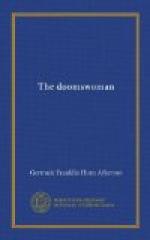“Dona Chonita,” he said, “like all women,—all beautiful and spoiled women,—you demand variety. I happen to be made of harder stuff than your caballeros, and you have not seen me for two months; that is all.”
“And if I saw you every day for two months would I no longer care whether you came or went?”
“Undoubtedly.
“Is it sweet or terrible to feel this way?” thought the girl. “Would I regret if he no longer made me tremble, or would I go on my knees and thank the Blessed Virgin?” Aloud she said, “It was strange for me to ask you such questions; but it is as if you had something in your mind separate from yourself, and that it would tell me, and you could not prevent its being truthful. I do not believe in you; you look as if nothing were worth the while to lie or tell the truth about; but your mind is quite different. It seems to me that it knows all things, that it is as cold and clear as ice.”
“What a whimsical creature you are! My mind, like myself,—I feel as if I were twins,—is at your service. Forget that I am Diego Estenega. Regard me as a sort of archive of impressions which may amuse or serve you as the poorest of your books do. That they happen to be catalogued under the general title of Diego Estenega is a mere detail; an accident, for that matter; they might be pigeon-holed in the skull of a Bandini or a Pico. I happen to be the magnet, that is all.”
“If I could forget that you were an Estenega,—just for a week, while you are here,” she said, wistfully.
“You are a woman of will and imagination,—also of variety. Make an experiment; it will interest you. Of course there will be times when you will be bitterly conscious that I am the enemy of your house; it would be idle to expect otherwise; but when we happen to be apart from disturbing influences, let us agree to forget that we are anything but two human beings, deeply congenial. As for what I said in the garden at Monterey, the last time we spoke together,—I shall not bother you.”
“You no longer care?” she exclaimed.
“I did not say that. I said I should not bother you,—recognizing your hostility and your reasons. Be faithful to your traditions, my beautiful doomswoman. No man is worth the sacrifice of those dear old comrades. What presumption for a man to require you to abandon the cause of your house, give up your brother, sacrifice one or more of your religious principles; one, too, who would open his doors to the Americans you hate! No man is worth such a sacrifice as that.”
“No,” she said, “no man.” But she said it without enthusiasm.
“A man is but one; traditions are fivefold, and multiplied by duty. Poor grain of sand—what can he give, comparable to the cold serene happiness of fidelity to self? Love is sweet,—horribly sweet,—but so common a madness can give but a tithe of the satisfaction of duty to pure and lofty ideals.”




